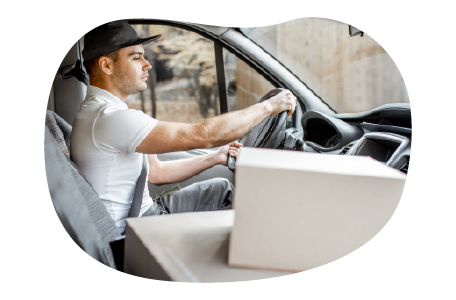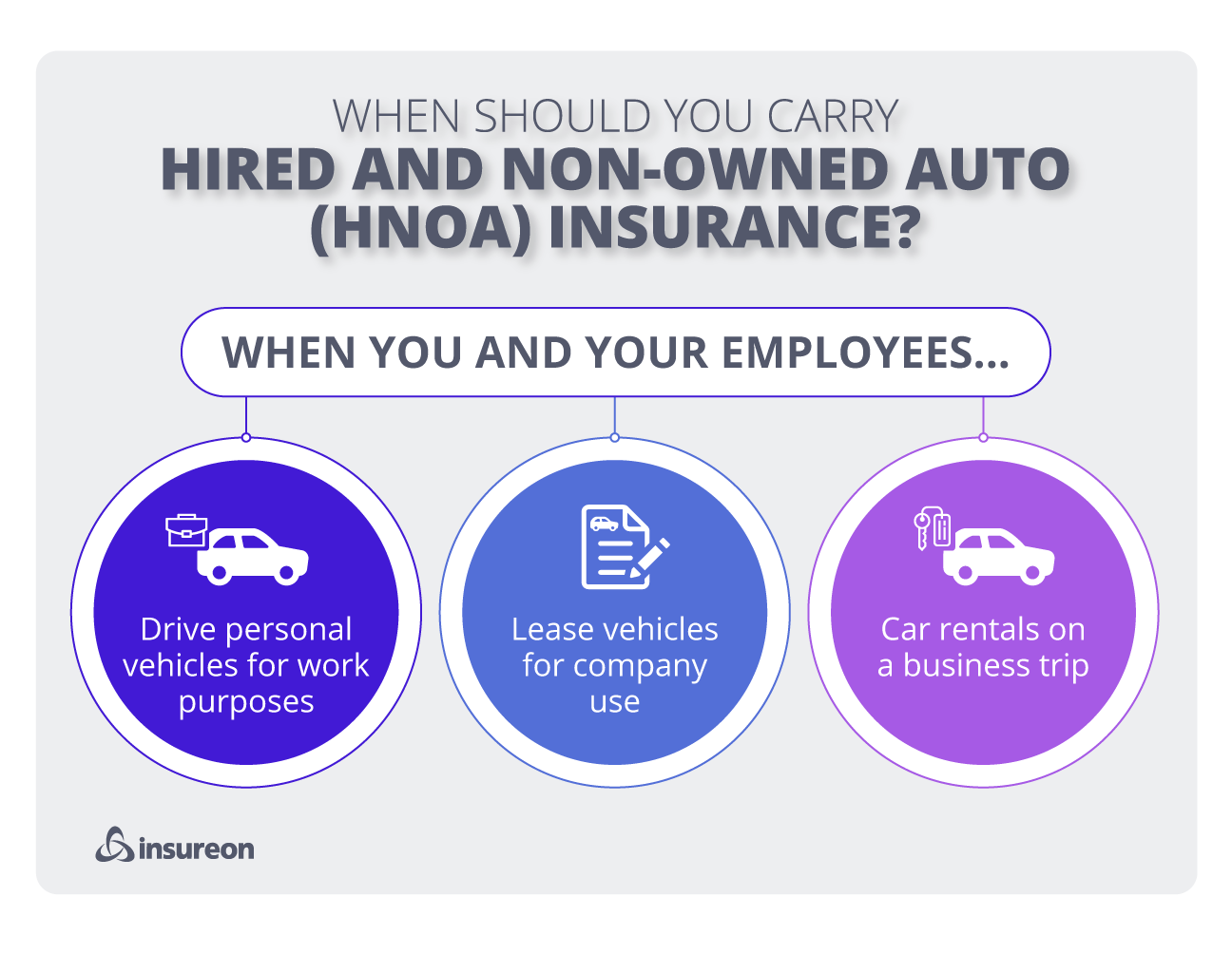
Hired and non-owned auto insurance
Hired and non-owned auto insurance
This policy provides liability coverage for accidents involving personal, leased, or rental vehicles used by your business.
Why is hired and non-owned auto insurance important for small businesses?
Commercial auto insurance only covers business-owned vehicles. Hired and non-owned auto insurance (HNOA) covers vehicles that your business uses but doesn’t own, such as rented, leased, and personal vehicles.
Hired and non-owned auto insurance coverage can help you avoid having to pay for auto accident lawsuits on your own. This type of lawsuit can be extremely expensive, especially if someone is injured, and could financially devastate your small business.
Your personal auto policy covers you while driving to and from work, but it won't cover accidents that happen while performing work-related tasks. For instance, you might drive your own car to meet clients, pick up supplies, or make deliveries.
Without HNOA coverage, you could end up responsible for legal fees from an accident, including a costly court-ordered judgment or settlement.

You might need HNOA insurance for:
- Personal vehicles used for work
- Car rentals for a business trip
- Vehicles leased by your company
What does hired and non-owned auto insurance cover?
Hired and non-owned auto insurance provides financial protection if you get into an accident in your own vehicle, an employee vehicle, or a hired auto used for business.
Specifically, HNOA insurance covers:
Property damage liability
If you damage another vehicle or someone else's property while driving your own car for a work errand, hired and non-owned auto insurance can help cover your legal costs. It can also pay to repair the other vehicle, though it won't cover damage to your own car.
Bodily injury liability
If a personal, rented, or leased vehicle driven for your business injures someone else, HNOA can help cover the cost of a lawsuit and the other person's medical bills.
However, workers' compensation insurance would cover costs if you or an employee gets injured while driving for business purposes.
How much does hired and non-owned auto insurance cost?

The cost of HNOA insurance is based on several factors, including:
- Number of vehicles
- Vehicle value
- Frequency and type of driving
- Claims history
- Employee driving records
- Policy limits and deductible
Verified business insurance reviews
Hear from customers like you who purchased small business insurance.
How does HNOA insurance work?
Most small business owners add hired and non-owned auto coverage to their general liability insurance or their commercial auto insurance policy as an endorsement, which helps save money on coverage. However, some carriers sell HNOA as a separate policy.
If your business has higher-than-average liabilities, such as a fleet of non-owned vehicles, you can increase your coverage limits with commercial umbrella insurance. Umbrella insurance boosts your maximum policy limits, meaning your insurance company will cover more expensive lawsuits.
What is an example of a hired and non-owned auto claim?
HNOA insurance protects your business against costly accidents that happen in vehicles owned by you or your employees, along with rented or leased vehicles used for work.
Here are a few examples of HNOA claims that would be covered by your insurer:
- A pizza delivery driver is using their own vehicle for deliveries. They accidentally rear-end another motorist while driving to a customer's home.
- A broadcasting business rents a car to transport a guest. The car slides on an icy road and damages a fence.
- A consultant uses a vehicle leased by their firm to travel from the office for client meetings. On their way to meet a prospective client, they run a red light and another driver is injured.
Who needs hired and non-owned auto insurance?
Hired and non-owned auto insurance benefits a wide range of small business owners who depend on personal, leased, or rented vehicles to conduct business.
You might consider a HNOA insurance policy if:
You or your employees use a personal car
Small businesses often need this coverage without realizing it. You might not think it’s a big deal to occasionally ask employees to use their own vehicles for work errands. But if they get into a car accident, their personal auto insurance provider might deny the claim.
For example, an employee rear-ends an SUV while driving their own car to meet a client. The other party sues to recoup their medical expenses, but the employee's personal insurer denies the claim since the accident happened while they were driving for work.
You're an independent contractor or self-employed
If you're an independent contractor or otherwise self-employed, your personal auto insurance won't provide protection for work-related auto accidents. HNOA insurance would provide coverage when you need to drive your own vehicle for work purposes.
You rent vehicles
If your business rents trucks, vans, or other vehicles, or operates under a trucking contract, HNOA insurance would provide coverage for your rented vehicles.
For example, if you or an employee is involved in an accident while making a delivery in a rental truck, HNOA insurance would cover the cost of a lawsuit or any damages.

What does non-owned auto insurance not cover?
While hired and non-owned auto insurance does provide coverage for bodily injury and property damage liabilities, it does not provide all the protection that a small business might need.
For instance, an HNOA policy does not cover:
Auto repairs
Hired and non-owned auto insurance only includes liability protection. It will cover costs if you damage another person's vehicle, but it won't provide coverage if your own car is damaged or stolen.
You should look to your personal auto insurance policy or rental agreement for coverage. However, this option might not be included in a standard policy.
Business-owned vehicles
Commercial auto insurance, not hired and non-owned auto insurance, helps pay for medical bills and property damage related to an accident in a business-owned vehicle. A commercial auto policy can also cover vehicle theft and various types of damage to a company vehicle, depending on the options you choose.
Personal use of vehicles
Hired and non-owned auto insurance only covers accidents that take place while you’re driving a personal or non-owned car for work purposes. It doesn’t cover accidents that happen while you’re using the vehicle for personal errands, which includes your commute to and from work.
Recently purchased vehicles
If you buy a vehicle for your business, it's not automatically covered by your existing auto insurance.
In order to protect newly purchased vehicles, you should get any auto liability coverage. This endorsement temporarily extends your commercial auto insurance or HNOA insurance to cover any vehicles recently bought for business use.
General liability insurance
Business owner’s policy
Errors and omissions insurance
Cyber insurance
Workers’ compensation insurance

Frequently asked questions (FAQs) about hired and non-owned auto insurance
Get answers to common questions about hired and non-owned auto insurance and similar types of coverage.
What is the difference between HNOA and personal auto insurance?
Personal auto insurance policies only cover claims related to personal use, including your commute and travel unrelated to work. They have lower limits and usually cost less.
If you’re involved in an accident while driving your personal car for work, your insurance company might deny your claim. That’s why small business owners who own a car used for work should consider commercial auto insurance or HNOA coverage.
If you’re uncertain which policy you need, check with an insurance agent.
What are HNOA insurance limits?
HNOA insurance limits can be defined as the maximum amount of money your insurance company will pay for a claim. These limits are set when purchasing your HNOA endorsement and often match the limits of your general liability policy or commercial auto policy.
Among Insureon policyholders, the average limit for auto insurance policies is $1 million.
How do I get proof of insurance?
It can take several weeks for a traditional insurance agency to send a certificate of insurance (COI) to new customers. That’s an issue for business owners who need immediate proof of coverage.
With Insureon, you can typically download a COI the same day that you apply for quotes, so you can send proof of insurance to banks and lessors, and use your vehicle right away.
Can you add an additional insured on hired non-owned auto coverage?
Small business owners can extend their HNOA coverage to subcontractors and other individuals with additional insured endorsements.
For example, a business hires a contingent worker through a staffing agency to assist with a temporary employee shortage. The business could add an endorsement to their HNOA policy that would allow the temporary employee to drive their own car or a rental car for work for a fixed period of time.
How does extended non-owned liability (ENOL) coverage differ from HNOA insurance?
Here's a quick breakdown of extended non-owned liability insurance vs. hired and non-owned auto insurance:
- HNOA extends your commercial auto policy to vehicles that your business doesn't own, but uses for work purposes.
- ENOL extends your personal auto policy to vehicles that you don't own, but use for personal reasons.
For instance, you might need ENOL coverage for a company car that you drive for personal errands on the weekend, or a car that you rent or lease for yourself.
As with HNOA, this policy is inexpensive. Both policies provide liability protection, but usually won't cover physical damage to your vehicle.
What is the difference between temporary substitute auto and HNOA coverage?
A temporary substitute automobile is a vehicle that is used while your insured car is unavailable for a short period of time. A common example of this is when an auto repair shop provides a loaner vehicle for customers who are waiting for their own car to be repaired.
If you're on the road with a temporary vehicle while using it for business purposes, your HNOA and personal auto policy would not provide coverage. Any expenses from an accident would be your responsibility.
If you plan on regularly using temporary substitute vehicles, you may want to consider a business auto policy (BAP) which covers all vehicles used by your business and your employees, including temporary substitutes.
Where can I learn more about hired and non-owned auto insurance?
You can find additional information about this policy in our FAQs about hired and non-owned auto insurance.
If you have any other questions about coverage or building your risk management plan, you can contact an Insureon agent.


























